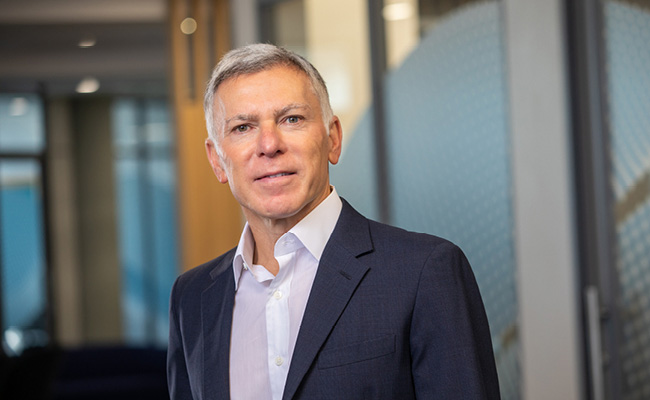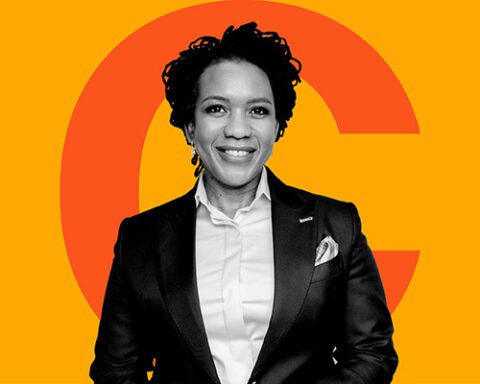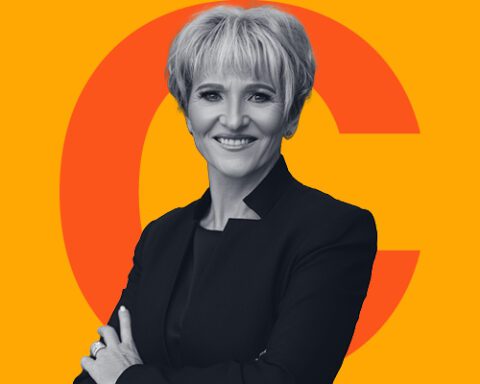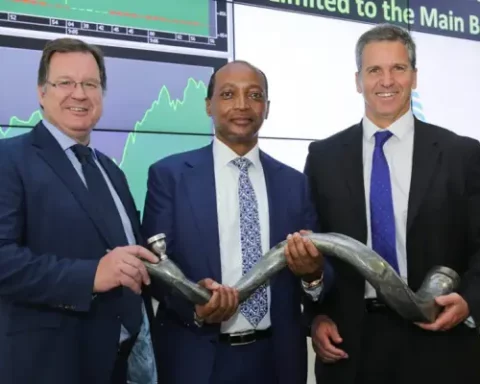Insurance company Discovery is reaping the benefits of years of hefty investments – with profit for the six months to the end of December soaring 27%, and its costly bank experiment close to breaking even, ahead of schedule.
Speaking to shareholders on Tuesday, CEO Adrian Gore lauded a “great period”, predicting a period of growth “with increasing cash and no requirement of leverage” any time soon.
It was one of the more impressive sets of financials released by a company that began in 1992 as a medical aid administrator, but which has grown to encompass life insurance, short-term insurance, behavioural economics programme Vitality and, now, a bank. Moreover, it has spread its tentacles overseas, with its Chinese health insurer Ping An clocking up R424m in profit in this period.
“We’re confident about the business model,” said Gore.
In recent years though, all the questions have loomed over the bank, where much of Discovery’s focus has been for the past six years. Critically, Gore says, the bank now has more than 1.1-million customers and broke even for the first month in December.
“It’s been making pure profit since January so, for the [next] six months, it will make a profit,” Gore tells Currency, though he’s doubtful that it will be big enough to offset the loss from the six months to December.
That is a big deal, since many feared the rash of new challengers – Discovery Bank, TymeBank, and Bank Zero being the foremost three – were all chasing elusive digital gains in a relatively small market where so many South Africans are loath to switch banks.
But the numbers Gore unveiled would have done much to quiet the critics: the bank’s revenues were 42% higher during the six months to December, its operating loss improved 57% to R145m, and customers grew 32% to surpass 1-million, far earlier than its 2026 deadline.
While investors don’t buy Discovery for its dividend – the company is a growth stock given its proliferation of new initiatives – it still upped its payout by just over a third, to 87c, and forecast full-year growth ahead of its 20% ambition.
While its shares only ended up 0.4% on Tuesday, this has to be seen in the context of a brutal day where the JSE fell 1% as the full horror of US President Donald Trump’s tariffs on Mexico and Canada roiled markets, with stock exchanges tumbling globally.
And Discovery’s shares have rallied 54% over the past year to R208 — well above its embedded value of R179 a share, which is a key metric for insurance firms.
Asked whether it’s a relief that the bank is no longer gobbling cash, Gore says: “You kind of project what you need; it’s in the mathematics of how you grow the group and as long as it plays out according to plan, there shouldn’t be stress in that. But when it does play out properly and you’re out of that, it does feel very different.”
But, he added, Discovery wouldn’t have got to this point “without the stress of the previous phase”.
Medical inflation chokes South Africa
South Africa, needless to say, remains Discovery’s biggest money-spinner. Its health-care administrator, which is the largest in the country, brought in R2bn in “normalised profit” – Discovery’s own measure of profitability that it points analysts towards.
That performance from Discovery Health was 8% above the previous year, and is a solid performance in an economy where growth has flatlined for years, and unemployment has soared, putting huge strain on medical aid members.
So how fragile is Discovery Health in the context of such a brittle economy? How much more medical inflation can cash-strapped South Africans handle?
Gore says there are three factors driving up medical inflation: tariffs, technology and “adverse selection”.
It’s not as if doctors are making a killing though. Gore says “fees going to doctors are going up less than [consumer inflation] so that’s not the cause”.
The second factor is technology – which Discovery estimates adds about 2% to medical costs above consumer inflation.
But the biggest factor driving up medical costs for the average South African is “adverse selection”. Gore explains that “the more medical aid costs, [the more] young people avoid it until they’re sick and then they move in, and because you’ve got open enrolment, you can move in and out quite freely”.
This means, he says, that “as a society you’ve got to make a choice: you can’t have all three – low cost, the best technology and open enrolment”.
Or put another way, how do you run a medical scheme where the healthiest people opt out, while the sickest demand all the newest technologies at the lowest-possible cost.
So what can be done?
“Our view is that you shouldn’t compromise on technology because you want to know, if you’re ill, that you have access to the best,” he says.
“We think the freedom of movement is too much – there’s got to be more incentives to be in the system when you’re young. And if you did that, we worked out that medical schemes would be 30% cheaper.”
It’s a critical point, and one which policymakers will need to confront if they don’t want to risk more healthy people eschewing the private medical aid system, and putting pressure on the overstretched public system.
Offshore respite
With South Africa’s market fragile, Discovery’s shareholders will at least be cheered by the fact that its offshore gamble is paying off.
In this six months, its international business brought in a fifth of its profit. It might not sound like much, but it’s still R1.5bn of the R7bn total – and, crucially, this rose 27% over this period.
It’s some vindication for Gore, as Discovery has taken flak over the years for spending huge time, effort and money on expanding its business outside of South Africa, with little to show for it.
The good news for shareholders is that the international business has come of age.
“The global business should grow faster – at [between] 20% and 30% – [than] South Africa at 15%. But if the South African business keeps growing at that rate, it’s hard to grow the other stuff faster,” he says.
In the UK, where Discovery’s Vitality Health and Life business sponsors football teams and test cricket, the business reported £40m in “normalised profit”. Gore says that business saw high claims in the previous year as problems in the UK’s state-run National Health Service spilled over, but Discovery’s business has now recovered.
“The next six months should be much better [than the second half of 2024], which was a loss for us, so you will see Vitality Health grow substantially in this period,” Gore says.
Of course, neither the UK nor South Africa are easy health markets, with the threat of state intervention always looming.
But Gore isn’t daunted by that. “It’s interesting: we’re actually better in complex declining markets – that’s where we do well. Look at South Africa – we tend to be very good in markets like health care, where the spend goes up but the perceptions are going down. And the UK is the same thing. I wouldn’t write them off.”
The trajectory, and the numbers, look good. But Discovery has always been a hard sell for analysts, who have questioned the company’s accounting assumptions.
“Embedded value growth was impressive but, as always, Discovery has some arguably aggressive assumptions in there,” says fund manager Keith McLachlan, who nevertheless describes the results as “good”.
Asked to explain “embedded value” to his granny, Sasfin’s David Shapiro says: “It’s the present value of in-force business. For example: you buy a policy and agree to pay an annual premium for X number of years. The company then discounts the premiums over the life of the policy to a value today.”
Aeon Investment Management analyst Shaakir Salie says the results underscore the strength of Discovery’s “shared value” model as well as the management team behind it.
He believes that the fact Discovery Bank broke even in December “was not only a significant milestone but it may lead to the market attributing value to the bank, allowing Discovery to continue its strong share price run”.
Insurance businesses are like elephants: cumbersome, hard to shift and when something goes wrong, everyone knows about it. But when it’s all going in the right direction – as Discovery seems to be now – it’s an impressive sight.
Top image: Discovery CEO Adrian Gore. Picture: supplied.
Sign up to Currency’s weekly newsletters to receive your own bulletin of weekday news and weekend treats. Register here.








